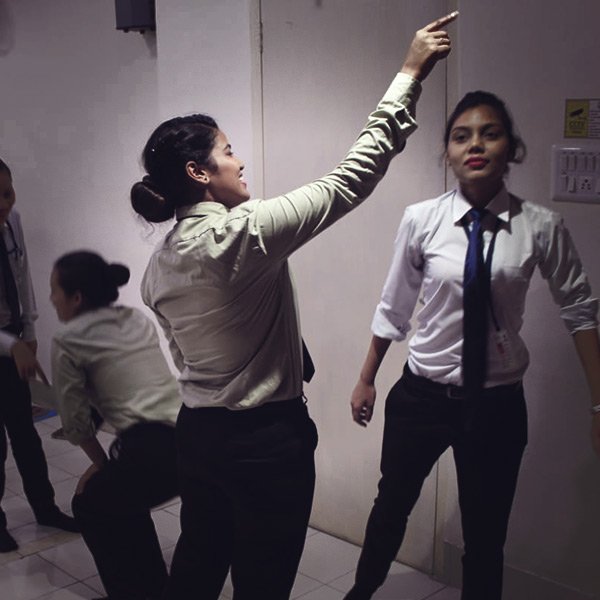
group therapy
JOIN US IN
inclusive group therapy
Everyone deserves equal access to quality mental health care. At Healing Rhyyithm we acknowledge and celebrate all identities and abilities in all bodies. Group Therapy sessions are facilitated by inclusive, culturally responsive therapists who provide a safe, non-judgemental space and thereby create change through active listening and collective care. The members of a group’s well-being is tended to, particularly their emotional health, which is seen as the shared responsibility of the group rather than the lone task of the individual.
THERAPY
for children
Expressive arts therapy for children allows them to overcome challenges and cross major developmental milestones. Expressive arts provide children with a ‘voice’ to freely engage and express themselves through drawings and movement awakening a child’s imagination and creativity to help them discover who they are and how to engage with their senses.
THERAPY
for adolescence
Adolescence is a time of complex emotions and experiences. In today’s time adolescents fight the challenges of behavioral problems, confusion over body image, anxiety, internal stress, early childhood trauma, peer pressure, and impulsive outbursts. Using movement and breathing exercises, visualization, music, metaphor, and rhythmic movement, the facilitator enables adolescents to dance for release, healing, creative self-expression, self-discovery, and joy.
- Release stress.
- Heal trauma.
- Restructure the emotions to empowering effects.
- Physical fitness, mind-body balance, alertness, poise, positive body image, confidence ,enhanced cognition, improved communication and social skills, creativity and mindfulness
- Fostering both team spirit as well as a free independent persona.
- Personal guidance and counselling provided for each individual creates an ethos of trust where adolescents can freely open up.
- Personal guidance and counselling provided for each individual creates an ethos of trust where adolescents can freely open up.
The sessions engage adolescents individually and/or in groups to address both the verbal and non-verbal elements of communication and work towards personality development.
THERAPY
for teachers
Teachers experience prolonged periods of fatigue, pain and stress as they may spend considerable time in the classroom and beyond. This stagnation of energy could lead to lack of vitality and luster in the mind. Group therapy helps them unwind, relaxes their mind and body and expel emotional exhaustion.
The sessions are not only beneficial for them alone, they learn various tools and techniques which they can directly take and apply to classroom teaching.
THERAPY
for adults
Group therapy sessions with adult members of all genders are facilitated keeping in mind the adult needs to gain mastery over feelings of monotony, stress, emotional exhaustion and anxiety. Therapy sessions help boost confidence, self-esteem, raise self-acceptance and self-approval.
THERAPY
for elderly
Expressive art therapy has been known to improve the cognitive and emotional mental health of the geriatric population. It helps encourage communication, free expression, improve physical flexibility which enhances mental agility and helps release mind-body agitation.
Moving to rhythm is a great way to feel invigorated for a person of any age. Movement therapy gives the elderly good cheer and emotional comfort while removing the tiredness of an old body and mind.
THERAPY
for women
Women with growing responsibilities in life start losing touch with their inner-selves and lose confidence, self-esteem and at times lacks purpose in lives. The baggage of the emotions which can comprise of past traumas, anxieties, sexual abuse, stress or all of it burdens the mind and slows down the body. Integrated therapy of movement and breathing exercises, art, visualization, music, drumming, and creative expression.
- Brings motion in the emotion.
Encourages positive body image.
- Boosts confidence & self-esteem.
- Connects to their inner–self.
- Brings mind-body balance.
- Brings mindfulness & builds positive self-image.
THERAPY
for men
Men are socially conditioned to often repress the emotions that lead to the buildup of stress, taking a toll on their health, personality development and even their family relationships. When it comes to movement men are at polar ends. They are either not moving at all by spending hours in front of the computer screen or are heavily into exercising, body-building and various other physical activities.
Movement therapy can be an excellent tool for balancing the inadequacy of physical movement and the optimum use of it amongst men.
- Help in self-expression in men.
- Release stress.
- Bring about balance in mind.
- Bring a flow in their blocked energy.
- Release all their pent up emotions.
Moving to rhythm is a great way to feel invigorated for a person of any age. Movement therapy gives the elderly good cheer and emotional comfort while removing the tiredness of an old body and mind.
THERAPY
for couples
Therapy sessions with couples focus on overcoming conflicting world views and expectation, concerning male/female role assignment which had been learned in each person’s family of origin. Misunderstandings and conflict arising from these issues, as well as other problems, have a tendency to lead toward rigid and nonproductive repetitive patterns of problem solving. Expressive art therapy for couples is designed to alleviate the origin of these issues and make visible the covert messages and hidden edicts. This enables couples to adopt effective problem-solving strategies and a creative approach in mastering a change in their relationship.
Movement
Moving together harmonizes, heals, enhances communication and joy and allows them to realize greater depths of the each other’s personality and cope with changes in life cycles.
THERAPY
for under privileged
Living in a poor or low-income household is a disturbingly common occurrence that many experience. Poverty has been consistently linked with poor health and increased risk for psychological disorders in children and adults that can persist across the life span. Chronic stress due to poverty and social exclusion implies a rising feeling of helplessness and hopelessness among the economically underprivileged. Group therapy for low-income communities uses intervention techniques to build resilience, self-esteem and aid self-expression. It helps in relieving stress ,expelling emotional exhaustion and relaxes their mind and bodies.
Integrated movement therapy along with NLP tools work wonders
Moving to rhythm is a great way to feel invigorated for a person of any age. Movement therapy gives the elderly good cheer and emotional comfort while removing the tiredness of an old body and mind.
THERAPY
for caregivers
There is a story of a village cobbler who mend the shoes of others but never repaired his own shoes. He soon went limp with pain andn had to stop work. Soon the villagers went limp too and having to wear unrepaired shoes.
Caregivers of people with disabilities, elderly and mental illnesses often lose out on their own self-care. Group therapy sessions for caregivers offers them a safe space to release their emotions,revitalize themselves through breathing exercises, rhythmic movement and other expressive art based mediums. Caregivers are encouraged to build their own self-care regime and abide by it.
If you are a parent, teacher, nurse, therapists, counselors, doctors, special educators, or physiotherapist- you are a Care Giver
THERAPY
for corporate
The corporate lifestyle of today demands more time being confined to restricted spaces and desk-job positions. This lack of movement coupled with stress due to lack of support, low-pay, lack of work opportunities and poor communication affects interpersonal relationships at work, lowers confidence and hampers self-esteem. Group therapy sessions for corporate members help to promote overall productivity, team-building and boosts confidence. It augments leadership qualities and promotes health and fitness. It enhances interpersonal relationships by improving communication skills.
Moving to rhythm is a great way to feel invigorated for a person of any age. Movement therapy gives the elderly good cheer and emotional comfort while removing the tiredness of an old body and mind.
THERAPY
for parkinson’s
Parkinson’s patients experience both movement and non-movement symptoms, including depression, anxiety, apathy, fatigue, pain, and impulse control disorders. The impact of Parkinson’s disease (PD) on an individual can quite often transcend the physical changes visible in his body. A growing fear of social isolation can worsen and could lead to chronic aloofness, if one doesn’t speak their minds and seek necessary support. Exchanging stories with those who have similar motor and cognitive impairments can lead to positive change. Group therapy using expressive arts have been found to be one of the most powerful treatment interventions of patients with Parkinson’s disease. Our group therapy sessions focus on gaining mind-body balance, coordination, mobility and addressing symptoms of anxiety, fatigue and depression.
Healing Rhyyithm with its mind-body interventions
If you are a parent, teacher, nurse, therapists, counselors, doctors, special educators, or physiotherapist- you are a Care Giver
DANCE MOVEMENT THERAPY
for trainee
Young adults have their own set of excitements along with a whole lot of nervousness of finishing schools and stepping unto the work world. It is a crucial period of complex emotions and varied experiences. Peer pressure and social media interactions add up to the complexity furthermore.
Movement enhances confidence.
- Which in turn improves communication and social skills
- In group sessions the participants realize the value of team spirit,along with having the freedom of expressing their independent persona./span>
- Young adults go through the process of creative self-expression and self-discovery using movement, breathing exercises, the power of visualization and metaphors.
The sessions make the induvial open to learning to upgrade themselves at the same time constantly be in touch with their creative self to explore and express new ideas.
THERAPY
for special needs
Individuals with physical, emotional and emotional disabilities often face difficulties in expressing themselves which in turn may manifest in psychological and behavioural symptoms. In expressive art-based interventions, group therapy offers the opportunity for authentic self-expression. Children and adults with disabilities suffer from poor social skills and low self-esteem. Group therapy offers a creative avenue for self-exploration which allows participants to communicate without restrictions, without worries of being judged. Activities in group therapy create body awareness and provide scope for improvement of general motor skills. It improves cognition and helps in gaining self-control.
A safe space is created in order for the child to open up and share his or her pain, fears, anger, and shame caused by his or her experience.
In a nutshell, movement therapy enables the differently-abled to express themselves fully.
THERAPY
for youth
In what is often termed as a challenging and tumultuous period of development, young adults often find themselves in vulnerable positions which may be influenced by intrinsic and extrinsic factors affecting their mental health and safety. In youth group therapy, using the Expressive Arts as an intervention technique and NLP as a diagnostic tool Healing Rhyyithm facilitators enable youth to release, heal, creatively express and discover their authentic selves. In group therapy, the importance of peer interaction as a tool for healing and recovery cannot be stressed enough. Engaging in healthy and meaningful peer interactions during group therapy sessions can help to alleviate feelings related to anxiety and stress.
The personal care of counselling provides a space of trust. This enables the youth to open up and deal with their emotions in a safe space.
drum circles
Drumming has been a tool for communication, celebration, and expression for thousands of years. Drum therapy is meant to be a fun release of stress and anxiety in the recovery journey. Therapists or counselors trained in drumming will lead a drumming circle and offer assistance to those new to the practice. Drumming has a number of benefits. Those in recovery from substance use disorder may struggle with anxiety, stress, PTSD, and other general mental health concerns.
Through group drumming therapy, people can open themselves up to a vulnerable place that allows for more significant healing and greater understanding. The drum circle can be a safe space where participants can express themselves and interact through percussion on an even playing field. Nonverbal communication and bonding with others make for a comforting and gentle community experience.

















